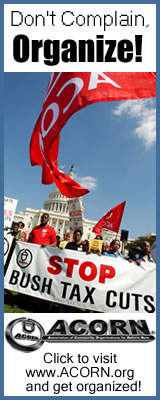| |
|

|
Re-printed
from ColorLines
RaceWire
 Los Angeles City Councilman Martin Ludlow's copy of Black Voices,
the unsparing photo-history of lynching, sits on his coffee table, where
visitors and his children will always be exposed to this "chilling
reminder of the history of this nation." Los Angeles City Councilman Martin Ludlow's copy of Black Voices,
the unsparing photo-history of lynching, sits on his coffee table, where
visitors and his children will always be exposed to this "chilling
reminder of the history of this nation."
Ludlow brought this up in front of a diverse audience of immigrants
and African Americans at a Sept. 13 event held in L.A.'s First AME
Renaissance
Center.
The councilman was one of 14 other community speakers who reflected on
the impact of the domestic war on terrorism and sought to "connect the dots" of
racial stereotyping, violence, and discrimination across different communities
in post-9/11 America.
"It's an amazingly daunting reality that we're all facing in this country," Ludlow
said. "This event raised my awareness of an opportunity for public officials
to go on the record as opposing this war on immigrants."
Organized by the Oakland-based Applied
Research Center, the "Public's Truth" was one of half a dozen
forums being held around the country to spotlight the increasingly widening
effects of racism, scapegoating, and "homeland security" policies
on people who have been variously beaten by skinheads, fired
from their jobs, jailed for immigration problems, and deported
in rising numbers.
"While there has been attention on the need to increase national security,
what hasn't been investigated is how these policies have extracted a human cost
on people's lives," said Gina Acebo, director of the center's Justice
is the Unifying Message Project.
Policies such as the PATRIOT Act have been billed as security measures
that target only suspected terrorists from Arab and Muslim countries,
but in reality,
they have amounted to sweeping changes that have ensnared all immigrants,
Acebo said. African Americans are also affected, she pointed out,
by the growth in law enforcement and prisons, along with diminished
attention to
inequity in public programs such as education, housing, and welfare.
Robin Toma of the Los Angeles County Human Relations Commission
cited L.A.'s 1200% spike in hate crimes and incidents of discrimination
as evidence of
the urgent need for local communities to broadcast the issue of
race in the fall-out from 9/11.
"What we were seeing with hate crimes was just the tip of the iceberg," Toma
added. "We clearly need to change the culture so that concern
for safety doesn't turn into stereotyping."
While
Ludlow reminded the audience that L.A.'s
black Crenshaw district used to be
a Japanese community before World War
II
internment,
another speaker,
Rev. Arthur Takemoto, described what it was
like to live through that period as a
high school
student. Racial profiling back then, said Takemoto,
meant terrified Asian immigrants wearing badges identifying themselves as "Chinese
American" or "Korean American" to
avoid internment.
Rasheed
Alam, a 19-year-old Lebanese American student, described being
beaten in February 2003 by a large group of white men with
baseball bats, who called him "sand nigger" as they
stomped on his face. The attackers were not charged with a
hate crime.
Another speaker, Adrian
Sanchez, a 34-year-old Mexican American, has recently settled
his case to remain in the country after being detained and under
threat of deportation because of a minor conviction for having
once sold $20 worth of marijuana in 1981.
"I lived in fear for two years that I would be deported and taken from my
children," Sanchez said. "It's not just me, there's thousands of people
going through the same thing and worse. What's even scarier is people are standing
by and letting this happen."
Sanchez's story illustrated how the war on drugs has crossed race lines and
merged with immigration enforcement policies, similar to how racial bias
in drug sentencing laws has resulted in disproportionate imprisonment of
African Americans.
Other community leaders at the event pointed out the necessity of making
linkages across racial and ethnic communities that have long been targeted
by racism and exploited for cheap labor. "It's not 9/11 when discrimination
against the poor, immigrants, and other people of color started. It's been
since the very beginning," said Maria Elena Durazo of Hotel Employees
and Restaurant Employees Local 11. She, along with several other speakers,
drew connections to the Civil Rights Movement in the current struggle to
win human rights over "war, poverty, and racism."
As Black Muslim leader Imam Saadiq Saafir of the Islamic
Shura Council of Southern California put it: "Before 9/11, I had
been used to being scrutinized, profiled. I had been used to being guilty
before proven innocent. Now I have a double whammy – An African American
in Muslim clothes.
"We
are all vulnerable."
|
| |
|
|
|



